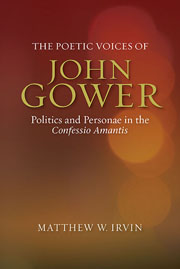Book contents
- Frontmatter
- Contents
- Dedication
- Acknowledgements
- List of Abbreviations
- Introduction: Making and Doing Love
- 1 The Inheritance of the Confessio Amantis
- 2 The Orientation of the Prologue to the Confessio Amantis
- 3 Amorous Persons
- 4 Pity and the Feminine
- 5 Labor and Art
- 6 Alienation and Value
- 7 The Love of Kings
- Conclusion: Identifying Amans
- Bibliography
- Index
- VOLUMES ALREADY PUBLISHED
5 - Labor and Art
Published online by Cambridge University Press: 05 March 2014
- Frontmatter
- Contents
- Dedication
- Acknowledgements
- List of Abbreviations
- Introduction: Making and Doing Love
- 1 The Inheritance of the Confessio Amantis
- 2 The Orientation of the Prologue to the Confessio Amantis
- 3 Amorous Persons
- 4 Pity and the Feminine
- 5 Labor and Art
- 6 Alienation and Value
- 7 The Love of Kings
- Conclusion: Identifying Amans
- Bibliography
- Index
- VOLUMES ALREADY PUBLISHED
Summary
Throughout Books I, II, and III, Amans does little to challenge Genius' analogous relationships between pity and piety, between literary affect and political identity, between factio and actio. This is primarily because the persona of Amans has no real political identity; when Venus asks him, “What art thou, sone?” (1.154), he responds simply, “A caitif that lith hiere” (I.159). Politically, “Amans” is not everyman but no-man, both in Venus’ court and in his lady's; he completely accepts his status as servant to love, and worries only about the availability of grace. His passivity and fundamental lack of self-knowledge keep him alienated in a fictional world, a world full of artfully composed affect rather than action. He not only lacks prudence; he mistakes the “art” of love for prudence. Genius, extending his practice from the Roman de la Rose, has produced exempla of Pride, Envy, and Wrath that reinforce Amans' passivity and alienation. While these same tales prompt readers to question the coherence and value of Genius' argument, Amans is concerned almost exclusively with strategic questions about how virtue will gain him his lady.
- Type
- Chapter
- Information
- The Poetic Voices of John GowerPolitics and Personae in the Confessio Amantis, pp. 157 - 191Publisher: Boydell & BrewerPrint publication year: 2014



